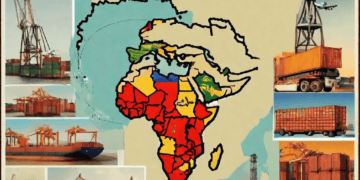Introduction to Free Trade Areas Free trade agreements play a significant role in facilitating duty-free trade within designated regions, allowing member countries to set tariffs on non-member imports. These agreements often focus on reducing or eliminating both tariff and non-tariff trade barriers among participating nations.
Examples of such agreements include NAFTA involving the United States, Mexico, and Canada, ASEAN Free Trade Area among Southeast Asian nations, SAFTA within the South Asian Association for Regional Cooperation, and the more recent African Continental Free Trade Area (AfCFTA) involving 54 out of 55 African Union members.
Understanding AfCFTA and Its Objectives The AfCFTA, signed in 2018 and enforced in May 2019, aims to eliminate tariffs and non-tariff barriers among African nations, fostering a single market encompassing around 1.2 billion people. It seeks to enhance intra-Africa trade, reduce the continent’s trade deficit, and promote free movement of goods, services, and people.
Impact of AfCFTA on Africa’s Trade Dynamics While Africa has had prior regional trade agreements like COMESA and ECOWAS, AfCFTA intends to build upon these arrangements, aiming for a higher level of integration and fostering a single market across the continent. It strives to promote diversification of exports, moving away from a focus on single commodities to value-added products and manufactured goods.
Challenges and Opportunities for Africa AfCFTA faces challenges such as historical trade disparities, regional inequalities, and infrastructural limitations. The agreement’s success relies on overcoming these hurdles, particularly in infrastructure development, language barriers, and access to finance.
India’s Historical Relations and Trade with Africa India has historical ties with Africa, dating back to pre-independence. Over the years, it has engaged in bilateral trade agreements with several African countries, developing trade partnerships and preferences, including the Global System of Trade Preferences and the duty-free scheme for least developed countries.
India’s Trade and Investments with Africa India maintains significant trade relations with Africa, with Nigeria being a key trading partner. Although India faces a trade deficit with most African countries, its trade basket has diversified over time, focusing on petroleum products, pharmaceuticals, and various manufactured goods.
India’s Investments and Challenges in Africa Indian investments in Africa span various sectors, predominantly in services such as healthcare, pharmaceuticals, and financial services. However, there are challenges related to infrastructural gaps, language barriers, and the dominance of other foreign investors, notably China, which poses competition.
Opportunities for India in AfCFTA Era The AfCFTA presents opportunities for India to strengthen its ties with Africa by integrating into global value chains, expanding trade linkages, and leveraging its expertise in sectors like telecommunications, education, and skills development.
Challenges and Prospects for India-Africa Collaboration Challenges faced by both Africa and India, such as infrastructural limitations, language barriers, and financial constraints, need to be addressed for successful collaboration. Initiatives like the Asia-Africa Growth Corridor and partnerships in education and digital infrastructure offer potential avenues for mutual growth.
Conclusion While the AfCFTA signifies a significant step towards African economic integration, its success hinges on overcoming challenges. India’s historical ties and diverse trade relations with Africa position it to play a crucial role in the continent’s economic transformation, requiring collaborative efforts to capitalize on emerging opportunities.
Get the latest supply chain report news at The Supply Chain Report. Learn more about international trade with tools from ADAMftd.com.
#FreeTradeAgreements #AfCFTA #IndiaAfricaRelations #NAFTA #ASEANFreeTrade #SAFTA #AfricaEconomicIntegration #TradeBarriers #IndiaTradeOpportunities #TradeChallenges #IntraAfricaTrade #EconomicTransformation #GlobalValueChains #ManufacturedGoods #IndiaAfricaCollaboration #InfrastructureDevelopment #TradeDeficit #DiversifiedExports #AfricaTradeChallenges #IndiaInvestments #TradeOpportunities #AfricaSingleMarket

















